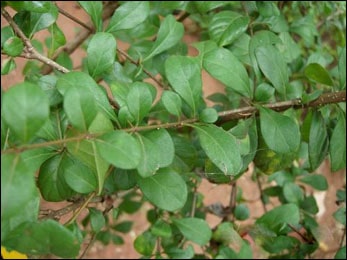Madanaphala, Emetic Nut (Randia dumetorum) - Properties, Benefits, Dosage

Description of Plant
Madanphala or Randia dumetorum is a large deciduous thorny shrub which grows up to 5 meters of height. Its Leaves are simple, ovate, wrinkled, shiny and pubescent in appearance. The Flowers are white, solitary and having honey like fragrance seen at the end of short branches. Fruits are globose, 1.8 - 4.5cm long, smooth berries with longitudinal ribs, yellow when ripe. Seeds many, compressed, and embedded in the dark fetid pulp. Fruit 1.8 - 4.5cm long, globose or broadly wide, longitudinally ribbed or smooth yellowish brown, crowned with persistent calyx-limb, fruits contains numerous seeds 0.4 - 0.6 cm long, compressed, smooth, brown and very hard. These seeds are called as 'Madanphala.
General Description
It is one of the most common herb used in Ayurveda which is famous for Panchkarma procedure called Vamana or vomiting therapy. Apart from this, this herb possesses various health benefits. It has two different species - Randia dumetorum and Randia uliginosa.
It contains different chemical constituents called saponins, valeric acid resin, wax, and some coloring matter. The other constituents include-citric acid & tartaric acids; randianin - sandianin; Randia Acid, ursosaponin, dumetoronins A, B, C, D, E & F; randoside A; Arachidic, Lignoceric, Linoleic, Oleic, Palmitic & stearic acids etc.
In ancient Ayurvedic text it is classified under different class. It is given to induce vomiting in case of poisoning.
According to Charaka it is best emetic drug and plays a role as antidote to many poisons. It is enumerated under Vamana Dravya's but not under Vamanopaga group. However it's found in the Asthapanapaga & Anuvasanopaga group. while in Ashthapana & Anuvasana Dravya it is considered as a prodrug.
According to Susrutha flower of Madana along with honey and rock salt is used to induce vomiting. Chunekarji quoted Pindara of Bhavamisra as Randia aliginosa.
Classification
- Kingdom - Plantae
- Sub kingdom - Tracheobionata
- Super division - Spermatophyta
- Division - Magnaliophyta
- Class - Magnoliopsida
- Sub Class - Asteridae
- Order - Rubiales
- Family - Rubiaceae
- Genus - Randia
- Species - dumetorum
Habitat
It is found in all over India Up to 4000 ft. Altitude especially in sub-tropical Himalaya from Jammu to Sikkim. It is found throughout tropical and subtropical forests of India. It is seen in Gujarat, Tamilnadu, forests of Dehradun, Suralik range, Orissa, Bengal, Bihar, South Maharashtra, coastal districts of South India and dry forests of India.
Names
- Botanical name - Randia dumetorum
- Common name - Madanaphala
- Bengali - Manphal, Mayanaphala
- Marathi - Gel, Gelphala, Madanaphala
- Gujarati - Mindhal, Mindhol, Mindhar
- Kannada - Mangarikai, Karigidda, Kari
- Malayalam - Malankara, Malamkarakka
- Punjabi - Mindhal, Rara, Manphal
- Telugu - Mrangakaya, Mongakaya
- Assam's - Maen, Behmona
- Tamil - Marukkarai
- Urdu - Mainfal, Jauz-ulQai
- English - Emetic nut tree
- Kashmiri - Madanfal
- Oria - Palova
- Arabic - Jauzulaki, Ji jul kai
Ayurvedic Properties
| Hindi / Sanskrit | English | ||
| Rasa | Tikta, Madhura | Taste | Bitter, Sweet |
| Guna | Laghu, Rooksha | Physical Property | Light, Dry |
| Virya | Ushna | Potency | Hot |
| Vipaka | Katu | Metabolic Property (After Digestion) | Pungent |
Effects on Doshas
It balance the vata and kapha doshas.
Classical Categorization
| Charak Samhita | Sushrut Samhita | Vagbhata |
|
|
|
Ancient Verse about Randia dumetorum

Bhavprakash nighantu, edition of 2010: verse 160-161, page no-77-79.
It states that different names and properties of Madanphala- madana, chardana, pind, nut, pinditaka, karhata, maruvak, shalayak or vishpushpak are the synonyms of madanphala.
Madanphala is madhura (sweet) and tikta (bitter) in taste. It is hot (ushna) in potency. It is dry (rooksha) and laghu (light) in nature. It is helpful in reducing cholesterol, pratishyaya (running nose, rhinitis), in the management of vidradi roga, vrana nashak, kusth, cough, shoth and gulma (abdominal tumour).
Reference
The Bhavprakash nighantu with elaborated Hindi commentary by Padmashri prof. K.C. Chunekar, edited by Dr. G.S. Pandey: edition of 1998: verse 160-161, page no-77-79.
Practical Uses of Randia Dumetorum
- Antibacterial activity - This herb possesses anti-bacterial activity and is used against various bacterial infections.
- Anti-Allergic activity - It is used in treatment of asthma, rhinitis, and cold.
- Anti-inflammatory activity - It is very effective to reduce the inflammation (shoth) and helpful in the treatment of edema, rheumatism.
- Analgesic activity - It has pain killer action (shoolanashaka). It is used in stomach pain.
- Immunomodulatory activity - It enhances the immunity of body and provides energy to fight against various infections.
- It is one of the potent medicines used for emesis. It is used in emesis therapy in Ayurveda. It is used in various poisonous cases.
- It is used in treatment of skin diseases, ulcers, flatulence and coeliac disease.
- It also helps to reduce the cholesterol level.
Part Used
Roots, fruit.
Dosage
- Therapeutic - 1 gram
- Vomiting therapy - 3 - 6 g
Side Effects
Its excess dose may cause excess of vomiting, indigestion and anorexia.



